Well this episode of our Puerto Rican adventure is coming to a close. We fly out tonight and head back to Colorado. It’s simply an indescribable experience to go thru what we have. We’ve basically started our life’s movie back up. In this movie there are new characters, new adventures and new challenges to overcome.
When we bought the house we knew that wood wasn’t desireable and put our offer in with the intent of tearing down the house that current sits atop the property. We have gone back and forth in our minds if tearing it down or fixing it up is the best idea. Being here for a few weeks we’ve seen some of the issues with a wooden house. They aren’t the safest place to be in a hurricane, they are more prone to pest issues, the wood doesn’t last very long in comparison to cement.
It was kind of a suprise when we saw bees living in the upper bedroom walls of the house. Not something we had planned on.
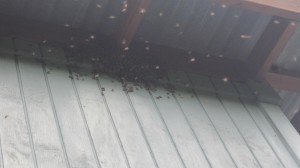
Bees on the outside of the house trying to get in (click for larger view)
Cassie and I had taken a bee keeping class in Colorado so we do have just a small amount of information about bees. Here in Puerto Rico the chances are very good that these are the African interbred version -Africanized bees- also known, by the less-informed, as killer bees. In our classes they had informed us that “killer bees” are more aggressive towards European hives and attackers. They are more likely to leave their hive and form new ones as well. But their stings are not more deadly or anything like that. They are pretty much the same just more likely to survive/thrive in tropical environments. For traditional bee keepers they are less desireable because they are not as docile and in Colorado it’s just too cold. If they abandon their hive they have less food to make it thru the cold and they die.
Cassie called the university (Mayaguez) and got ahold of a local bee keeper. Jose came out to the house and assessed the situation. Apparently there are 4 separate colonies of bees in the walls upstairs! LOL. Cassie and I were kind of shocked. I mean, we knew there would be unexpected problems but we just hadn’t thought of bees. Lizards? Sure. Cockroaches? Sure. But bees? We hadn’t thought of THAT!
This is apparently a problem with the wood houses. These bees have been living there for a very long time. One of the colonies has ~30,000 bees. We spoke to the previous caretaker and he said that Kathy (the previous owner who passed away in the house) lived with the bees and wouldn’t move or kill them. He said she was a “hippy”..lol. I can believe that she didn’t have much of an issue with them. We were in the bedroom several times and they just went about their honey business not really minding us at all. Still though….I’d want them gone if we were to try and live in the wood house.
Jose (the bee guy) turned out to be a really cool guy. Very friendly and energetic. We even went to his place of work where they do agricutural research for the University of Mayaguez:
He gave us about 30 mangos and we bought a few trees there for the property. When we got back home we planted them.

We’re excited to see how big these grow when we get back!
It was a lot of fun to learn about new plants (which we are constantly doing) from people who live here. Katrina Kruse has been helpful in sharing her experiences with growing various plants/fruits. It’s very different than home and we feel like little kids asking what everything is. “What’s that?” ,”What’s that taste like?” ,”What’s that called again?”
Well back to the bees…. We weren’t sure what to do but we figured even if we tear down the house, the bees would have to be removed. Well Jose and his friend Moses came over to start removing them because they wanted the hives! It was quite an experience.

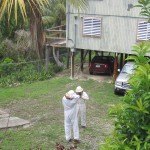
Moises and Jose in the beehive part of the house and outside
Once the got the wall opened up here is what there was:
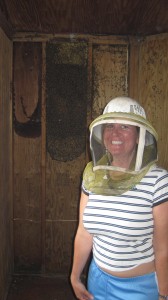
Cassie is smiling but was actually freaking out because a bee was crawling on her leg at this moment
Since they’ve removed the hive we’ve been stung a few times. Before that we didn’t have any problems. I assume they let out the pheromones that let the other bees know the hive is under attack. The remaining bees are picking up on this. Bee stings hurt!
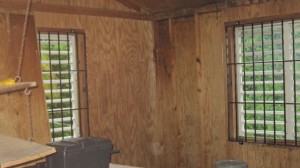
After the bees have been removed
We have so much more to write about. We found out more from the caretaker about Kathy, we have more stories about the bee keepers and a few other side adventures! This will take another week to really try to explain! We’re really enjoying life here in Rincon even with all the unknowns and are not ready to come back! This has been a kick (or is it sting)!




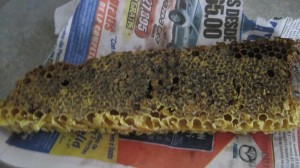
to bee or not to bee!!
UNCLE Bzzzzzzzzzzzzzzzzzzzzzzzzzzzzzzzzzzzzzzzzzzzz
So did Jose tell you they were Africanized? Knowing very little about bees (an orientation class at UC Davis), I wonder why he would want to keep Africanized bees, unless they were for university research. I’ve heard that PR doesn’t have killer bees, but you can’t believe everything you hear, so I wonder what the experts say.
BTW, I’m following your journey with much interest, since we recently moved to PR ourselves. I hope you can get everything in order so you can move here for good, knowing you’ll need some patience to make things happen here–part of the paradise tax. But worth it in the end! — Fran
Hi there, yes in PR we have africanized bees. Since they move the decendats bees of PR are almost extinct.
Good question. We may have just assumed they were, but I can’t remember if he confirmed it or not.
Cassie might remember. Cassie?
Yah, he said they all are Africanized in Puerto Rico. They are mixed with the European types, so they are not fully “African killer bees” but they do have those dominate traits. It didn’t seem to faze these guys, and they were still desirable obviously -because they came and took this hive for free!
This video might be of interest to you guys.
Why Puerto Rico’s Killer Bees Stopped Killing – https://www.youtube.com/watch?v=psBomn2cPNw
The researcher says that the Africanized bees might have become less aggressive in Puerto Rico not because of interbreeding but because they couldn’t migrate during the wet season so they needed more foragers and less soldiers to survive.
That’s really interesting! Thanks Adolfo! I have heard that the bees of Puerto Rico may offer the best of both worlds in terms of adaptability and survival of bees in general. Sometimes the thing we fear the most may offer the most hope. http://www.puertoricoreport.com/puerto-ricos-honey-bees-show-promise/#.Vw-oUE2FPbg
http://www.ncbi.nlm.nih.gov/pmc/articles/PMC3492899/